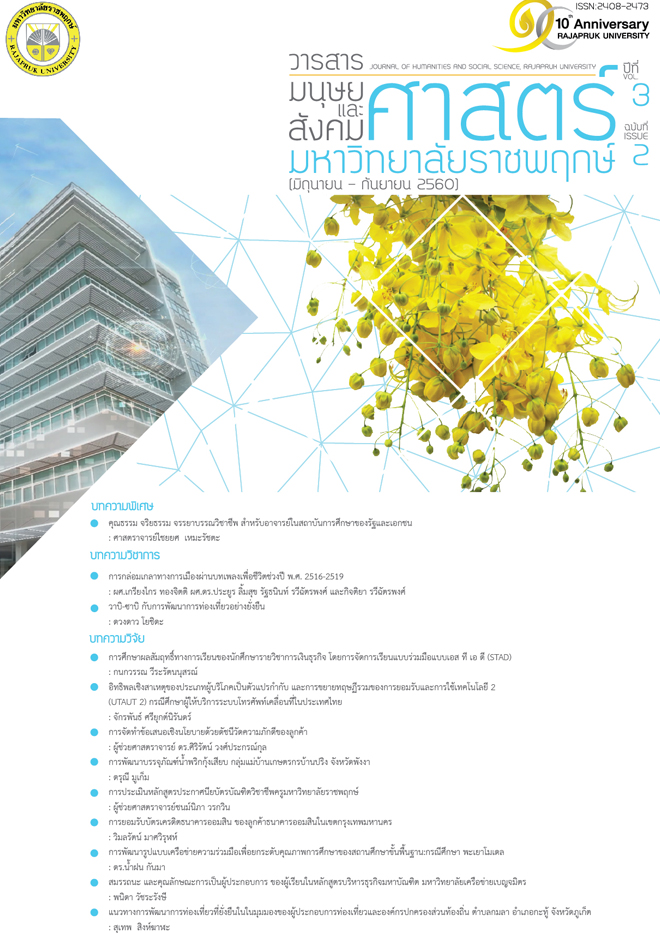Political Socialization through Songs for Life during 1973-1976
Main Article Content
Abstract
The purpose of this article was to study songs for life as agent of political socialization and medium of political movements. This study focused on songs for life that composed during 1973 to 1976 in Thailand that boomed in that time. This study included the influences of songs for life by various ideologies. The findings of this study revealed that before October14th, 1973 incident, the counter political ideologies were liberalism and democracy. After that incident, by the late of 1976, theme of songs for life changed into radical by the changing of political ideologies. From liberalism and democracy to socialism and the ruling class resisted by stirring songs or rightist songs. Because they realized that songs for life were leftist songs and after October 6th, 1976 incident, songs for life were ended until 1978.
Article Details
References
ขจร ฝ้ายเทศ. (2548). การสื่อสารทางการเมืองในเพลงลูกทุ่งไทย พ.ศ. 2507-2547. ดุษฎีนิพนธ์วารศาสตรดุษฎีบัณฑิต มหาวิทยาลัยธรรมศาสตร์.
ขนิษฐา จิราภรณ์สิริกุล. (2541). วัฒนธรรมทางการเมืองแบบประชาธิปไตยของนักเรียนชั้นมัธยมศึกษาปีที่ 6 : กรณีศึกษานักเรียนโรงเรียนบางกะปิ. วิทยานิพนธ์รัฐประศาสนศาสตรมหาบัณฑิต มหาวิทยาลัยเกษมบัณฑิต.
จรูญรัตน์ สุวรรณภูสิทธิ์. (2531). การศึกษาบทเพลงเพื่อชีวิตที่เกี่ยวข้องกับขบวนการนักศึกษา ช่วง 2516-2519. วิทยานิพนธ์ศิลปศาสตรมหาบัณฑิต มหาวิทยาลัยธรรมศาสตร์.
ชูเกียรติ ฉาไธสง. (2541). ตำนานคนตำนานเพลง. กรุงเทพฯ : สายส่งศึกษิต.
ทัศนีย์ เทิดธนกาญจน์. (2546). อิทธิพลของบุคคลต้นแบบที่มีต่อพฤติกรรมการเลียนแบบและความตั้งใจซื้อสินค้าที่มีความเกี่ยวพันสูง-ต่ำกับวัยรุ่น. วิทยานิพนธ์นิเทศศาสตรมหาบัณฑิต จุฬาลงกรณ์มหาวิทยาลัย.
ธีรภาพ โลหิตกุล. (ม.ป.ป.). ปฐมบทเพลงลูกทุ่งและเพลงเพื่อชีวิต พ.ศ. 2480-2500. กรุงเทพฯ : โสมสาร.
ธีระวัฒน์ ประกอบบุญ. (2546). เพลงเพื่อชีวิตกับภาพสะท้อนทางสังคมไทย : วิเคราะห์เนื้อหาเพลงเพื่อชีวิตในช่วงปี พ.ศ. 2535-2540. วิทยานิพนธ์วารสารศาสตรมหาบัณฑิต มหาวิทยาลัยธรรมศาสตร์.
บุญยงค์ เกศเทศ. (2536). แลลอดวรรณกรรมไทย. กรุงเทพฯ : โอ เอสพริ้นติ้งเฮ้าส์.
มนต์สวรรค์ จินดาแสง. (บรรณาธิการ). (2537). ตำนานเพลงเพื่อชีวิต สายธารแห่งการต่อสู้. กรุงเทพฯ : โรงพิมพ์ตุลา.
วรุณ ฮอลลิงก้า. (2536). การวิเคราะห์เพลงเพื่อชีวิตระหว่าง พ.ศ. 2516-2519. ปริญญานิพนธ์การศึกษามหาบัณฑิต มหาวิทยาลัยศรีนครินทรวิโรฒ.
ลือชัย จิรวินิจนันท์. (2532). เพลงเพื่อชีวิต : การนำเสนออุดมการณ์ใหม่ : ศึกษาเฉพาะช่วง14 ตุลาคม 2516 – 6 ตุลาคม 2519. สารนิพนธ์รัฐศาสตรมหาบัณฑิตมหาวิทยาลัยธรรมศาสตร์.
สมเกียรติ วันทนะ. (2551). อุดมการณ์ทางการเมืองร่วมสมัย. กรุงเทพฯ : สำนักพิมพ์อักษรข้าวสวย.
เสถียร จันทิมาธร. (2541). เพลงเพื่อชีวิตมาจากไหน. กรุงเทพฯ : มติชน.
สุกรี เจริญสุข. (2538). ดนตรีวิจารณ์. กรุงเทพฯ : มหาวิทยาลัยมหิดล.
Almond, Gabriel A. and G. Bringham Powell. (1966). Comparative Politics : A Developmental Approach.Boston : Little Brown.
Dawson, Richard E. and Prewitt, Kenneth. (1969). Political Socialization. Boston : Little Brown.
Easton, David and Dennis, Jack. (1969). Children in the Political System. New York : McGraw-Hill.
Heywood, Andrew. (2007). Politics. New York : Palgrave.
Langton, Kenneth P. (1969). Political Socialization. Oxford : Oxford University Press.
Rush, Michael and Althoff, Philip. (1971). Introduction to Political Sociology. Barkley : Western Printing Press.


